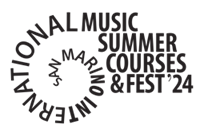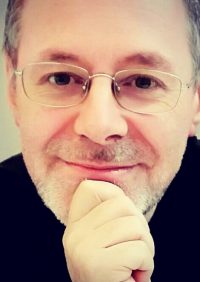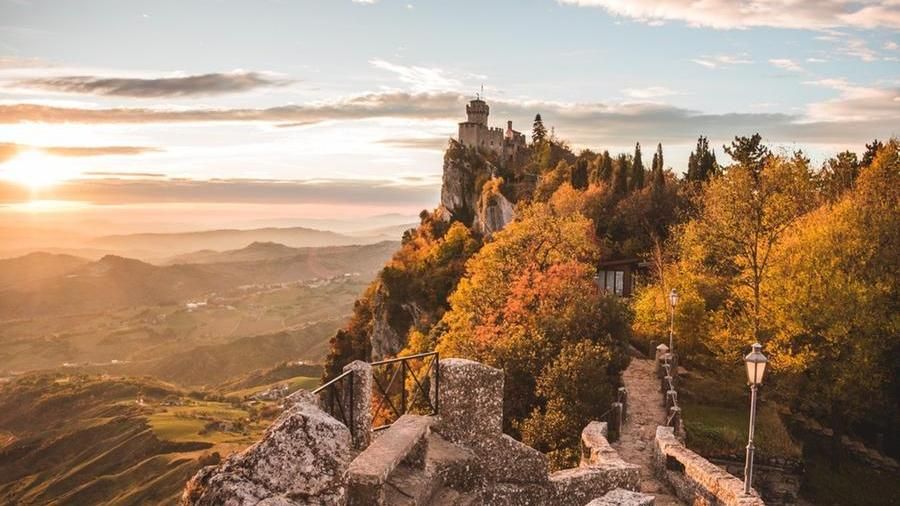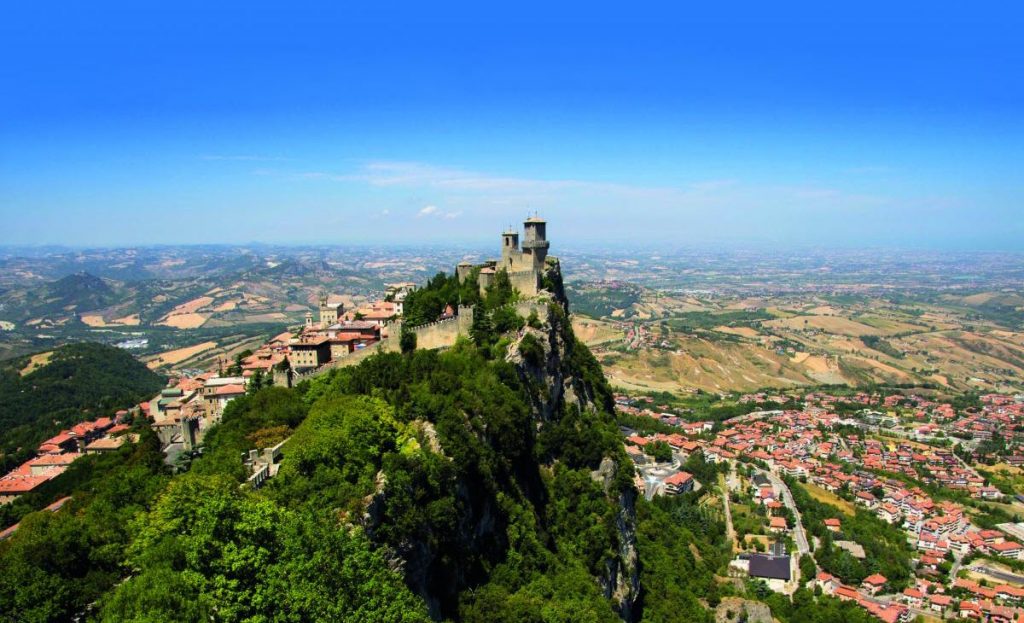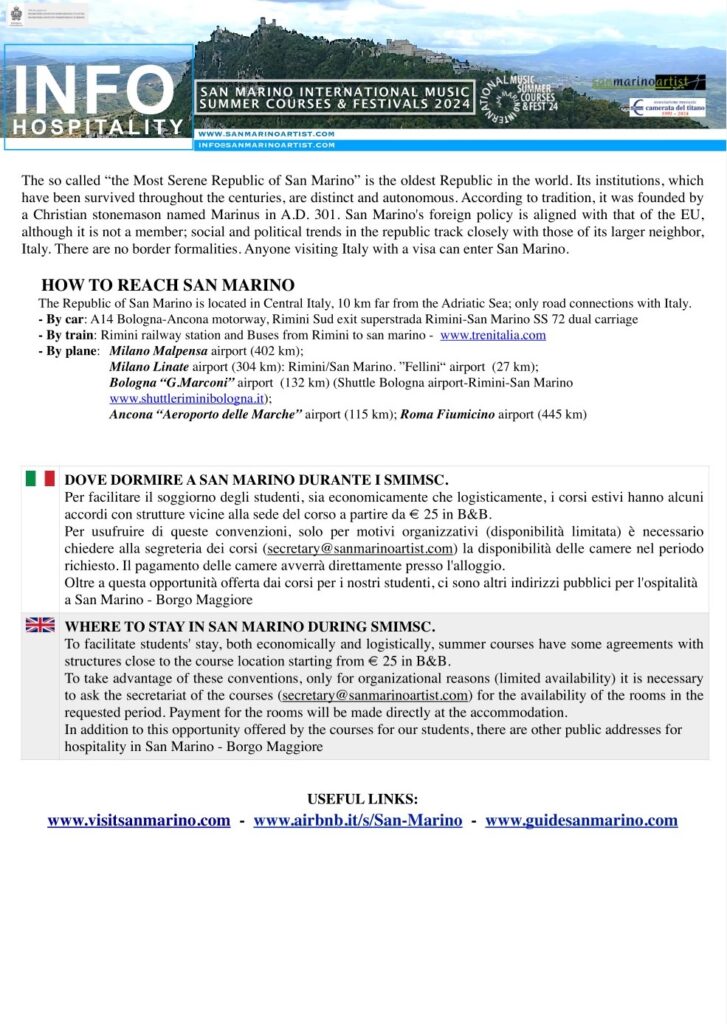read more...
2. And today who are you first of all : a composer, director, professor, man of culture? Why?
In an increasingly specialized society it is difficult to say that I am a bit of all this. Perhaps the least important aspect of my profession is that of a composer, but otherwise I am the Conductor of the Camerata del Titano Orchestra, I am a credible and very much appreciated teacher, I think I am a man of culture, meaning a person who tries to carry on some values and tries to do to think and to realize something to make the reality in which he lives and works grow and grow. In this sense, yes, I believe I am a man of culture who, thanks to his skills, tries to realize ideas and realize new projects useful to keep alive the interest in the music of the past (from the Middle Ages to the nineteenth century) and for that of today and of tomorrow, focusing on the involvement and the training of young musicians.
3. He once said that he would always like better from the orchestra performance. And what is perfection for you? Is it possible in the art of acting? Are there any examples? What are the conditions of the perfect performance if we talk about an orchestra?
“Perfection” is a word that scares all musicians. It does not exist or it is very difficult to reach. Even more so when we talk about a “living organism” like an orchestra that is composed of many musicians with ideas and visions of music that are sometimes not only different, but even conflicting. When the Director manages to convince all the members of the orchestra to share his idea of music and convey all the differences towards a single goal, this is already a good premise for a good job. This “magic”, the “magic of music” can be born everywhere, in large rooms, with large orchestras, but also in small towns, in small realities … every time that people, of qualified musicians, come together with the desire to go all in the same direction, making available to others their own intelligence, their ideas, their soul, their art. So there is good music there. Perfect? It could also happen.
4. And as for musicians (and singers) in general – what is the guarantee of success, in your opinion? What is needed to become a great musician?
The answer is quite simple: first of all the study, a lot of study; discipline, a lot of discipline. Then the meeting with important Masters, who can not transmit only the “technique”, but also the essence of music and making music. Finally it also takes a bit of luck. Paganini said that it was not so difficult to play the violin “just put the right finger, in the right place, at the right time”. Here for the success of a young artist one could also say that it is not difficult to become famous and great musicians. In addition to the indispensable talent “enough” to do the right thing, at the right time, in the right place …. and I would add, with the right people.
5. you have what it takes for the music, you direct different musical projects: Camerata del Titano, Voice Academy in San Marino, San Marino International Music Summer Courses, etc. What leads you to do so much for the music world? Can we say that work of the conductor of an orchestra and the work of the producer merge?
No. They are very different professions. The Director tries to shape a musical idea. The producer tries to give form and substance to an organizational idea. They are two different professions, but one needs the other one. History teaches us that musical ideas, great movements like Baroque, Classicism, Romanticism have found fertile ground where there was a very solid organization. As a “man of culture”, aware that there are no longer the times of Vivaldi’s Venice or Mozart’s Vienna, I am trying in a modern way to create some organizational conditions in which the art of music can be best expressed.
Having skills in the two different sectors complicates a lot my personal life , but it is much easier to think, coordinate and make efficient the two , music as well as music organization.
6. Classical is what in the past was the innovation, but followed us with the centuries. In your opinion, music which is being created now could become classic for the posterity?
At the beginning of the 20th century, music has taken the avant-garde and experimentation path and, unlike painting, it has not succeeded in bringing the general public close to the opera of the ‘800, to classical symphonies. This is a matter of fact. This because music needs more time to enter people’s memories and experiences. Today there are repertoire works that when they were performed the first time were scandalous or were accepted with controversy. Here we try with our projects to be “cross-eyed”, i.e. to have an eye to the past and one to the future. Especially with San Marino International Music Summer Courses we try to cultivate the tradition (from the most remote with a project on the medieval sequence to the classical repertoires closest to us), and at the same time we also try to give a voice to the future of music: In this meaning our “New Music Project”, with a focus on the Musical Theater and improvisation. We hosts as well some of the monuments of avant-garde contemporary music. But not only the most advanced avant-garde, our attention to the music of today and tomorrow is also expressed with other composition courses , more traditional but no less interesting and actual .I believe that our Summer Courses are really the correct image of our vision of today’s music world.
7. Finally, the last question is a bit personal. You origins are from the smaller and oldest Republic of the world – San Marino. What does “Sammarinese” mean to you?
It means being part of a very small population (about 30/40 thousand San Marino people all over the world); it means also being invested with a representative responsibility when we think and realize projects. But one thing for me is fundamental: if San Marino is the smallest and oldest Republic in the world, the ideas that this small country expresses must not be small. They but must be able to spread out to the big world, to go on and compete with everyone. Ideas do not have the strength of armies, they have the strength of those who have them, share them and succeed in turning ideas into concrete facts. This means to be citizen of San Marino and at the same time a citizen of the world.
1. Maestro, racconti per favore del Suo itinerario nel mondo della musica.
La mia formazione è per certi aspetti come quella di molti musicisti, per altri diversa. Inizio lo studi del violino poi mi appassiono alla composizione, e completo il percorso formativo al Conservatorio di Milano e con Master con grandi Maestri., Contemporaneamente continuo anche gli studi conseguendo una laurea in economia, e master in Management Artistico presso l’Università di Milano. Un percorso forse un po’ strano e forse anche unico, ma che sono riuscito a far convergere in quello che sono oggi.
2. Ed oggi chi e’ prima di tutto: compositore, direttore, professore, uomo di cultura? Perche’?
In una società sempre più specializzata é difficile dire che sono un po’ di tutto questo. Forse l’aspetto meno rilevante della mia professione è quello di compositore, ma per il resto sono Direttore dell’Orchestra Camerata del Titano, sono un didatta credibile e molto apprezzato, credo di essere un uomo di cultura, intendendo con tale definizione una persona che cerca di portare avanti alcuni valori e cerca di fare, pensare, realizzare qualcosa per far conoscere e far crescere la realtà in cui vive ed opera. In questo senso si, credo di essere una uomo di cultura che grazie alle proprie competenze cerca di concretizzare idee e realizzare nuovi progetti utili per mantenere vivo l’interesse per la musica del passato (dal medioevo al XIX secolo) e per quella di oggi e di domani, puntando sul coinvolgimento e la formazione dei giovani musicisti.
3. Una volta ha detto che vorrebbe sempre meglio dall’esibizione d’orchestra. E cos’e’ la perfezione per Lei? E’ possibile nell’arte del recitare? Ci sono degli esempi? Quali sono le condizioni della esibizione perfetta se parliamo di un’orchestra?
La “perfezione” è una parola che spaventa tutti i musicisti. Non esiste o è difficilissima da raggiungere. Ancora di più quando si parla di un “organismo vivente” come un’orchestra che è composta da molti musicisti con idee e visioni della musica a volte non solo diverse, ma addirittura contrastanti. Quando il Direttore riesce a convincere tutti i componenti dell’orchestra a sposare la sua idea di musica e convogliare tutte le differenze verso un unico obiettivo, ecco già questo è una buona premessa per un ottimo lavoro. Questa “magia”, la “magia della musica” può nascere ovunque, in grandi sale, con grandi orchestre, ma anche in piccoli centri , in piccole realtà… ogni volta che delle persone, dei musicisti qualificati, si riuniscono con la voglia di andare tutti nella stressa direzione, mettendo a disposizione degli altri la propria intelligenza, le proprie idee, la propria anima, la propria arte. Allora li c’è buona musica. Perfetta? Potrebbe anche succedere.
4. E per quanto riguarda i musicisti (e cantanti) in generale – qual’e’ la garanzia di successo, nella Sua opinione? Cos’e’ necessario per diventare un grande musicista?
La risposta è abbastanza semplice: prima di tutto lo studio, tanto studio; la disciplina, tanta disciplina. Poi l’incontro con Maestri importanti, che non sappiano trasmettere solo la “tecnica”, ma anche l’essenza della musica e del fare musica. In ultimo ci vuole anche un pizzico di fortuna. Paganini diceva che poi non era così tanto difficile suonare il violino “basta mettere il dito giusto, al posto giusto, nel momento giusto”. Ecco per il successo di un giovane artista si potrebbe anche dire che non è difficile diventare famosi e grandi musicisti. Oltre al talento indispensabile “basta” fare la cosa giusto, nel momento giusto, nel posto giusto…. e aggiungerei, con le persone giuste.
5. Lei ha della stoffa non solo in musica, dirige anche diversi progetti musicali: Camerata del Titano, Voice Academy a San Marino, San Marino International Music Summer Courses, ecc. Che cosa le fa fare cosi’ tanto per il mondo della musica? Si puo’ dire che il lavoro del direttore di un’orchestra ed il lavoro del producer si somigliano?
No. Sono due professioni molto diverse. Il Direttore cerca di dare una forma ad un’idea musicale. Il producer cerca di dare una forma ed una sostanza ad un idea organizzativa. Sono due professioni diverse che però l’una ha bisogno dell’altra. La storia ci insegna che le idee musicali, i grandi movimenti come il Barocco, il Classicismo, il Romanticismo hanno trovato terreno fertile là dove vi era una solida organizzazione. Come “uomo di cultura”, consapevole che non sono più i tempi della Venezia di Vivaldi o della Vienna di Mozart, cerco in modo moderno di creare delle condizioni organizzative nelle quali si possa esprimere al meglio l’arte della musica. Ed avere competenze nei due diversi settori complica molto la mia vita personale, ma è molto più semplice pensare, coordinare e rendere efficienti i due aspetti (musica e organizzazione della musica).
6. Classica e’ quello che in passato era l’innovazione, ma ci ha seguito con i secoli. Nella sua opinione, adesso si crea la musica che potrebbe diventare classica per i nostri posteri?
All’inizio del ‘900 la musica ha preso la via dell’avanguardia e della sperimentazione e a differenza della pittura, non è riuscita ad avvicinare il grande pubblico che è rimasto legato all’opera lirica dell’’800, alle sinfonie classiche. Questo è un dato di fatto. È così, perché la musica ha bisogno di più tempo per entrare nella memorie e nel vissuto delle persone. Oggi sono repertorio opere che quando furono eseguite la prima volta risultarono scandalose o furono accolte con polemica. Ecco noi cerchiamo con i nostri progetti di essere “strabici”, cioè di avere un occhio al passato ed uno al futuro. Soprattutto con San Marino International Music Summer Courses cerchiamo di coltivare la tradizione (da quella più remota con un progetto sulla sequenza medioevale ai repertori classici più vicini a noi), e allo stesso tempo cerchiamo anche di dare una voce al futuro della musica: In questo senso il nostro “New Music Project”, con un focus sul Teatro Musicale e sull’improvvisazione, ospita alcuni dei monumenti della musica contemporanea d’avanguardia. Ma non solo l’avanguardia più spinta, la nostra attenzione per la music d’oggi e di domani si esprime anche con altri corsi di composizione, come dire, più tradizionale ma per questo non meno interessante e attuale. Credo che i nostri Summer Courses siano veramente l’immagine corretta della nostra visione del mondo della musica oggi.
7. Infine, l’ultima domanda, e’ un po’ personale. Le sue origini sono nella piu’ piccola e piu’ vecchia repubblica del mondo – San Marino. Cosa significa per Lei “essere Sammarinese”?
Significa far parte di un piccolissimo popolo (circa 30/40 mila sammarinesi in tutto il mondo); significa essere anche investiti di una responsabilità rappresentativa quando pensiamo e realizziamo dei progetti. Ma una cosa per me è fondamentale: se San Marino è la più piccola ed antica Repubblica del mondo, le idee che questo piccolo Paese esprime non devono essere piccole, ma devono poter andare per il grande mondo e confrontarsi e competere con tutti. Le idee non hanno la forza degli eserciti, hanno la forza di chi le ha, le condivide e riesce a rendere le idee dei fatti concreti. Questo per me significa essere sammarinese e allo stesso tempo cittadino del mondo. show less
